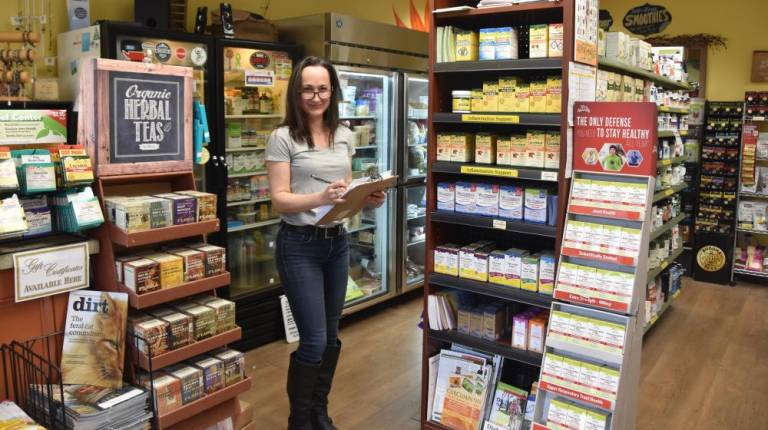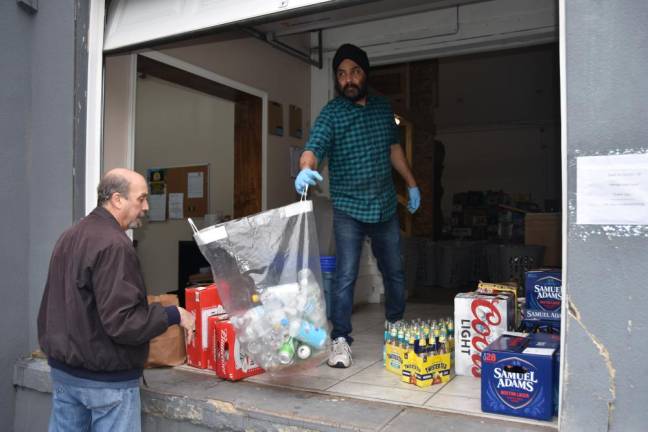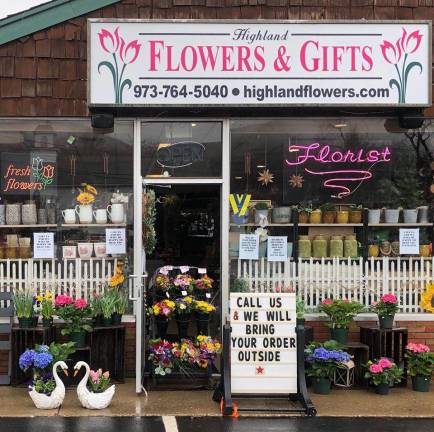Mom and Pop shops hustle harder
In the time of COVID-19, flowers replace hugs, cans still need to be recycled, practically everyone is bike riding and it’s nice to feel human while you shop.



There isn’t a single local business that hasn’t been affected by the coronavirus one way or another. Those that are able to stay open are getting crafty--and working harder than ever to fulfill orders while meeting safety and social distancing guidelines.
Riding it out
This time of year has always been Sussex Bike’s peak season.
“Traditionally, we say: ‘When the temperature goes up, the faucet gets turned on,’” says owner Jason Ziegler, who has been running the shop for 22 years now.
But with a mild winter that brought an early end to winter sports, social distancing, kids home from school, and adults working remotely, the urge to get outside and do something active seems to be higher than average—and Sussex Bike’s numbers reflect that. Ziegler says the store is a good 35 to 40% busier than usual during its peak season.
“We’ll get 20, 30 boxes a day coming in. Freight trucks of bikes. It’s nonstop,” explains Ziegler, who has been working around the clock. Nowadays, he’s been working until 2 or 3 in the morning handling repairs, placing orders, and keeping everything on track with heightened demand. He then turns around and starts all over again at 7 or 8 a.m.
The bike shop, which has been serving Sussex County since ‘79, is considered an essential business because it technically falls under the transit category. People aren’t really commuting by bike around Sussex County, says Ziegler, but are riding for their mental and physical health.
“One of the things I find most positive about it is...we’re getting orders for bikes, but it’s not just a kid bike. It’s a kid and a parent,” says Ziegler. “It’s neat seeing that family unit come back together.”
Plus, it’s a way to get exercise outdoors without getting too close to anyone.
“You can really do this in a true social-distancing manner,” adds Ziegler. “Let’s face it, most people aren’t going to ride within an arm's-length of someone else for safety reasons. It’s like built-in social distancing.”
Despite the heavy increase in sales, Sussex Bike is staying true to its roots, ensuring each bike that goes out the door is the right fit, calling customers to have a conversation about their online orders to check that sizing is correct for each rider.
The shop is still open during its regular hours, but is doing things a little differently to create a safe environment. Staff is wearing gloves and masks. When someone shows up with a repair, the bike is dropped outside, and the customer discusses the bike’s issues with an associate while maintaining an appropriate distance. For sales, the setup is similar. A Sussex Bike employee brings the bicycle outside for a test ride, and if a purchase isn’t made, it’s completely sanitized afterwards.
Despite the never-ending list of things to do, Sussex Bike is down for the ride.
“If someone comes to me and they have repairs or they have something they wanna do within a day or two—then by golly, let’s do it. Let’s get it done.”
Out with the empties
Surjaed “Tony” Aneja operates Cash for Cans in Chester, which is open daily. He says that yes, he has help, but it is rare that Aneja himself is not there. After temporarily closing his redemption center at the end of March, he re-opened his door in early April, throwing open the roll-up door to his loading dock where cans and bottles are stored and trucked off to distributors. On a nice spring day, four customers were lined up in the parking lot, with garbage bags of empties. This way, “I am safe, you are safe, everybody is safe,” he explained.
Instead of his usual set-up, where customers dump their bags into a bay and he sorts through the bottles and cans with a kind of rake, Aneja sorted on his feet, quickly – Michelob there, Vintage Seltzers there, Dasani water bottles in with parent-company Coke bottles. Silently, he handed back a bottle that he does not accept here. He popped inside to the cash register and handed each customer their take-home of five cents per can. On a recent rainy, windy day, Aneja was operating inside, with a sign up urging distancing – although there was just one customer on her way out as this reporter stopped by.
The state considers redemption an essential service, though the Department of Environmental Conservation website says it would not “actively enforce violations at facilities unable to fulfill redemption operations due to resource restrictions during the ongoing COVID-19 response efforts.”
Aneja, 40, who came to America five years ago with his wife and two sons, has been praying for everybody’s safety. “I’m so sad for too much death,” he said, shaking his head. “No reason.” He takes a moment to process the question: Did you consider staying closed?
“ShopRite open, car garage open, everybody’s open,” he said, nodding to Brady’s Auto Repair, which shares a driveway. “I provide for service everybody. Doesn’t matter for money. I provide a service for customer. No have a lot of space, everybody home. I take, somebody feel good.”
Sending hugs
“Here it is the Monday after Easter, and I’m having such a hard time getting flowers,” says Lori Struck, owner of Highland Flowers and Gifts in Vernon, New Jersey.
“This morning I left my house at 6:30 to go to my wholesaler, and they called me and they said: ‘Turn around, we can’t keep up with the orders, you’re gonna have to wait until 10 o’clock.’”
Going to her wholesalers first thing in the morning is a part of Lori’s new routine. Highland Flowers and Gifts is pretty much a one-woman-show now, with the exception of Struck’s immediate family helping her with deliveries.
But she’s happy to log the extra hours. Just a few weeks ago, when it was first announced that all non-essential businesses would have to close, Lori was getting ready to shut down her shop. Then, a couple days later on Monday morning, a guideline was given allowing online businesses to continue to operate. Lori went to work, business as usual. She hasn’t stopped since.
“I had no idea I was actually going to be working more. I haven’t had a day off in three weeks,” says Struck. Despite being limited to curbside and deliveries, she’s keeping up the pace with sales. This past week in April was busier than it was last year.
After she makes the early run to her wholesaler and gets back to the shop at 9 a.m., the computer has been spitting out about a dozen orders every morning as she’s turning on the lights.
“I don’t think anyone realized it was going to be this busy, flower-wise,” she says. “I’ve been crazy busy with sending sympathy arrangements.”
Lori notes that there hasn’t been an uptick in funerals, but there are more flower orders moving from neighbor to neighbor, family to family because it’s one of the only ways for people to express their condolences from afar. Funerals and services are happening in groups of ten or less.
“Unfortunately, grieving is a very important part of life. You need to grieve. You need connection. You need people to grieve with you. And you can’t do that: you can’t have funerals, you can’t have gatherings,” explains Struck.
So they’re sending flowers instead.
“It’s like sending a hug, you know? You can’t do it personally, but you can have me deliver something to their doorstep and they can feel the love,” she says.
Her other major source of orders? Birthday celebrations. She’s had to reorder her helium tanks and sweet sixteen balloons. People are reaching milestone birthdays without being able to gather. Instead, they’re sending balloons.
“It’s a little bit of sunshine in these gloomy days,” says Struck.
Shopping like a human
When you step into Down 2 Earth, a gluten-free health food store between Dunkin Donuts and Pizza Express in Florida, NY, and owner Lisa Mitchell greets you with a phone cradled between her neck and shoulder, it’s almost possible to forget for a moment that the world outside has changed drastically.
Regulars might notice one big change: There’s nobody back in the kitchen. Her three employees were uncomfortable continuing to work, so Mitchell is back to doing what she did when she started her store seven years ago: working open to close six days a week. That means getting there early to make prepackaged lunches, stocking shelves, popping into the kitchen to whip up a juice, doing all the baking, cleaning, inventory, ordering, bookkeeping and promotion and administrative stuff, and what she’s best known for: the thoughtful consulting, as she’s ringing up customers, about whatever ails them.
“I had to sort of reignite that fire, I was like alright, I need to be 100 percent on point and keep my wits about me and try to be every person. But yeah, it’s a little lonely,” she said. “I might talk to myself while I’m pricing.”
The ordering has been a juggling act, with people stopping in for vitamin C and zinc and colloidal silver, local eggs and organic produce; and increasingly for everyday things like toothpaste and shampoo, and – newly – hair dye (which Mitchell doesn’t carry but will special order). The couple weeks when everyone was in a stocking-up frenzy, “It required scavenger hunts to try to find decent manufacturers that still had these things in stock, to keep things on the shelves when everyone’s running out of everything,” she said.
Other than bolstering her immune support and hand sanitizer offerings, and struggling to keep churning out fresh baked goods, the shelves look much the way they always have. “We’ve been offering the same thing,” said Mitchell. “We’ve been trying to maintain that normalcy.”
For businesses everywhere, maintaining a semblance of normalcy right now requires untold effort behind the scenes. Mitchell spent a few nights at her store until 9 or 10 p.m. at the end of March, applying for the payroll protection program that would let her keep paying her employees (her kitchen manager has come in a couple times off-hours to do things like baking). One night, after closing, Mitchell took a break from digging through her file cabinets for the numbers the forms required. “I called next door to Frank’s to see if they were still open,” she recalls laughingly. “I had to stand in the doorway and ask what type of Argentina Malbecs they had. I sat here with wine in my coffee mug, just to make this a little less miserable.”
Mitchell was allowed, but not required, to be open, and she toyed with the idea of taking this strange period as a one-time chance to spend more time with her two high-school-aged boys. Crunching the numbers, Mitchell thought she might be able to survive being closed for a month. “It was tempting initially,” she said. But that question answered itself. “It was one of those two in the morning, staring at the ceiling type things,” she said. “It was like, you know what? No, I need to be here. Part of the reason I built the store was I wanted to build sort of a little oasis, from all the unhealthy choices out there, and make it a place people feel comfortable coming in to and talking to us. I didn’t want to compromise that. I wanted to maintain a little bit of an oasis, where people can come in and feel a little bit normal. And feel like okay, it’s still a place where I can get some of the things that I need on a smaller scale and not feel afraid.”
She’s taking measures to avoid draining herself – psychologically, spiritually, adrenally – by closing at 3 or 4 p.m. instead of 5 or 7 p.m., and driving the two minutes from her house to meet customers by appointment if they can’t make it during those hours. She’s been shipping a box a week to a couple of teacher customers who aren’t driving by anymore because schools are closed.
With schools closed for the rest of the school year, the art of finding that work-life balance is a moving target for everyone. “I’m still trying to spend more time with my kids and help them with their schoolwork and try to be a mom in the middle of all this,” said Mitchell. The previous Saturday, “I was supposed to close at 3 and I was stuck here ‘til 5:30. People were still coming in, the phone was ringing off the hook. It was kind of backwards,” because the rest of the day had been slow, said Mitchell. Heck, the rest of the month had been slow; the store is running on about half of normal sales. “It’s just the luck of the draw in retail, you don’t know when everyone’s going to show up.”
There are silver linings to wearing every hat in the place. “I like to use my creative brain, and I’ve obviously had to re-ignite that in the last few weeks. It’s been fun, you know?,” said Mitchell. “I’ve made some new lunch item recipes, I made a new soup. It’s the world I had to step out of in order to take care of everything else, and I left that to the ladies.” Getting back into the kitchen, “even though it’s tiring and it’s messy and it keeps me here stuck later, I do enjoy it. The fact that I have a living element to the store; it’s not just dusty things sitting on shelves. The fact that I’m able to prepare things that help people eat healthy food, and not just pizza all day long,” she laughs.
A customer who’d just walked out had said, “‘I like coming in here, because I can just come in and talk to you,’” Mitchell related. “You know, we keep our six-foot distance and whatever, but she can come in and do her thing, grab a couple things and actually feel human, a little bit social,” she said. “I guess that’s kind of what’s propelled me to be here while my kids are home.”